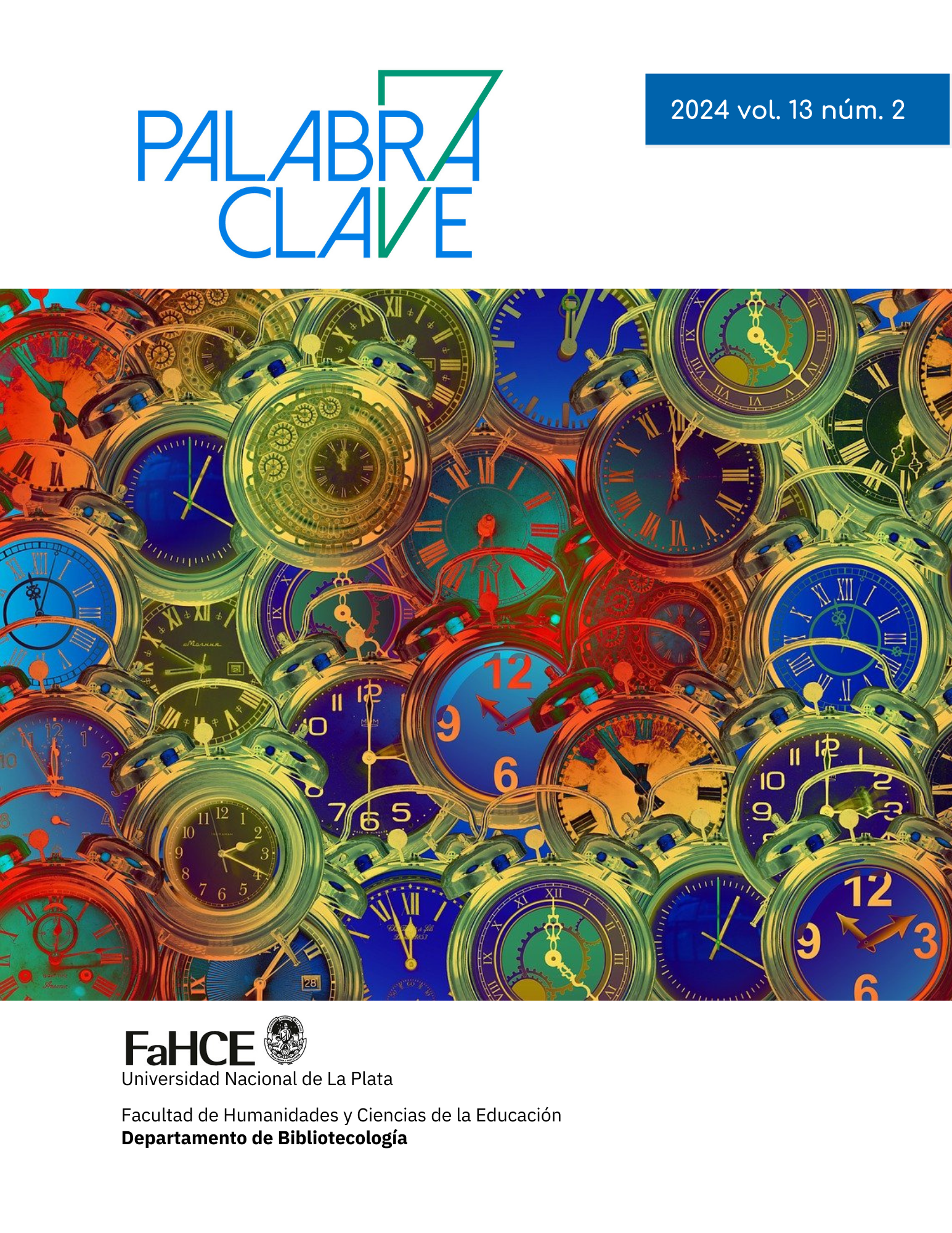Knowledge management and organizational memory: research update
Main Article Content
Abstract
In a previous study, a knowledge management model was developed, focused on organizational memory and strategic guidelines based on the critical success factors of this management that considered organizational memory to contribute to the success of knowledge management and provide the construction of sustainable competitive advantages that has been validated in Spanish organizations. In view of the expressive results arising from this previous study, this work carried out a bibliographical survey that encompassed research on knowledge management, critical success factors of knowledge management, knowledge management models and organizational memory, with the objective of identifying advances that have occurred in recent years in the research area. The searches, from 2019 to july 2023, were carried out in the Database of Periodicals in Information Science and in the Scientific Electronic Library Online. 308 records were retrieved which, after inconsistencies and duplications, resulted in 133 valid records. It is emphasized that this bibliographic survey will serve as a basis for a larger project that will validate the study described above in Brazilian organizations. As a result, this survey made it possible to carry out an analysis of what was produced in the years following the research in the Spanish context to ensure that new and important findings were considered when carrying out the research in the Brazilian context. In addition, it was possible to conclude that, despite knowledge management and organizational memory being in evidence, reinforcing the importance of researched terms in information science, the relationship between searched terms still needs further studies.
Downloads
Article Details

This work is licensed under a Creative Commons Attribution-NonCommercial-ShareAlike 4.0 International License.
References
Alvarenga Neto, R. C. D. de. (2008). Gestão do conhecimento em organizações. São Paulo: Saraiva.
Arora, R. (2002). Implementing KM: A balanced score card approach. Journal of knowledge management, 6(3), 240-249. DOI: https://doi.org/10.1108/13673270210434340
Barreto, A. M. (2015). Maturidade de gestão do conhecimento: um estudo comparativo entre o Organizational Knowledge Assessment (OKA) e o Knowledge Management Maturity Model (KMMM). Periódico científico negócios em projeção, 6(2), 13-23.
Chong, S. C. & Choi, Y. S. (2005). Critical factors in the successful implementation of knowledge management. Journal of knowledge management practice, 6(1), 234-258.
Dalkir, K. (2005). Knowledge management in theory and practice. Oxford: Elsevier, Linacre House, Jordan Hill.
Damian, I. P. M. (2020). Gestão do conhecimento voltado à memória organizacional: modelo de implantação e fatores críticos de sucesso em organizações espanholas. Relatório científico, FAPESP.
Damian, I. P. M. & Moro Cabero, M. M. (2020). Mapeamento da produção científica sobre gestão do conhecimento e memória organizacional: um enfoque sobre os modelos de implantação e os fatores críticos de sucesso. Perspectivas em gestão & conhecimento, 10(3), 226-245. DOI: https://doi.org/10.22478/ufpb.2236-417X.2020v10n3.49616
De Sordi, J. O. (2015). Administração da informação. fundamentos e práticas para uma nova gestão do conhecimento. São Paulo: Saraiva.
Drucker, P. (1997). Sociedade pós-capitalista. São Paulo: Pioneira.
Gil, A. C. (2007). Gestão de pessoas. enfoque nos papéis profissionais. São Paulo: Atlas.
Heijst, G., Spek, R. & Kruizinga, E. (1997). Corporate memories as a tool for knowledge management. Expert systems with applications, 13(1), 41-54. DOI: https://doi.org/10.1016/S0957-4174(97)00021-3
Hoffman, W. A. M. (2009). Gestão do conhecimento: desafios de aprender. São Carlos: Compacta.
Melgar-Sasieta, H. A. M., Beppler, F. D. & Pacheco, R. C. S. (2011). A memória organizacional no contexto da engenharia do conhecimento. DataGramaZero, 12(3), 1-15.
Nascimento, N. M. & Vitoriano, M. C. C. P. (2017). O estudo da produção documental e a memória organizacional em ambientes empresariais. Em questão, 23(1), 202-227. DOI: https://doi.org/10.19132/1808-5245231.202-227
Nonaka, I. & Takeuchi, H. (1997). Criação do conhecimento na empresa: como as empresas japonesas geram a dinâmica da inovação. Rio de Janeiro: Campus.
Pizzaia, A., Pegino, P. M. F., Colla, J. E. & Tenório, N. (2018). O papel da comunicação na gestão do conhecimento: aspectos relevantes e estímulo a novas pesquisas. Perspectivas em gestão & conhecimento, 8(2), 62-81. DOI: https://doi.org/10.21714/2236-417X2018v8n2p62
Santos, J. C. Dos, Moro-Cabero, M. M. & Valentim, M. L. P. (2016). A memória organizacional como diferencial competitivo em ambientes organizacionais. En Anais do XI Seminário de Pesquisa em Ciências Humanas, Londrina, Brasil. DOI: https://doi.org/10.5151/sosci-xisepech-gt13_89
Senge, P. (1998). A quinta disciplina: arte e prática da organização de aprendizagem. São Paulo: Best Seller.
Silva, S. L. (2004). Gestão do conhecimento: uma revisão crítica orientada pela abordagem da criação do conhecimento. Ciência da informação, 33(2), 143-151. DOI: https://doi.org/10.1590/S0100-19652004000200015
Silva, H. M. & Valentim, M. L. P. (2008). Modelos de gestão do conhecimento aplicados à ambientes empresariais. In M. L. P. Valentim (Org.), Gestão da informação e do conhecimento no âmbito da ciência da informação (pp.157-174). São Paulo: Polis, Cultura Acadêmica.
Sveiby, K. E. (1998). A nova riqueza das organizações: gerenciando e avaliando patrimônios do conhecimento. Rio de Janeiro: Campus.
Taylor, F. W. (1966). Princípios de Administração Científica. São Paulo: Atlas.
Wilson, T. D. (2006). A problemática da gestão do conhecimento. In K. Tarapanoff (Org.). Inteligência, informação e conhecimento (pp. 37-55). Brasília: IBICT; UNESCO.
Wu, J. & Holsapple, C. W. (2013). Does knowledge management matter? The empirical evidence from market-based valuation. ACM transactions on magement information systems (TMIS), 4(2), 1-23. DOI: https://doi.org/10.1145/2500750
